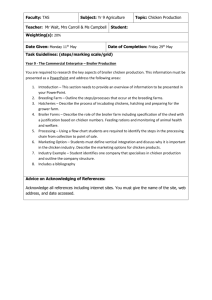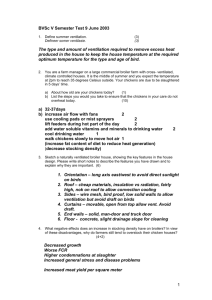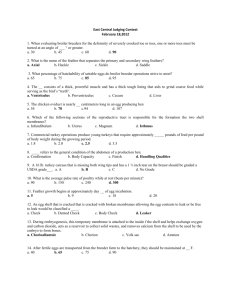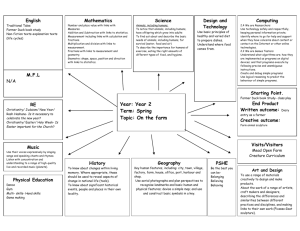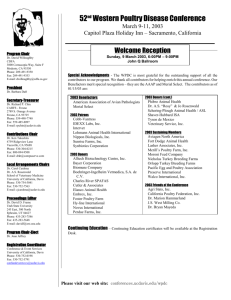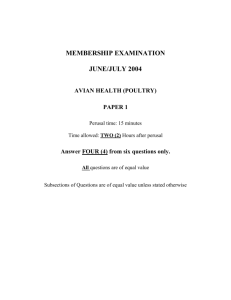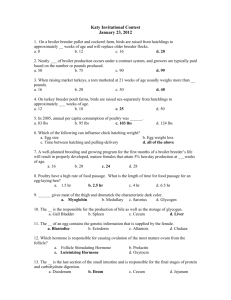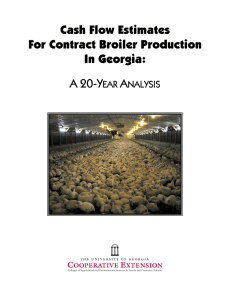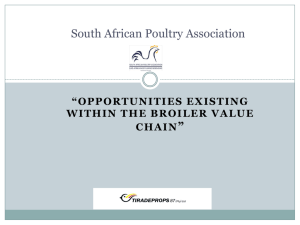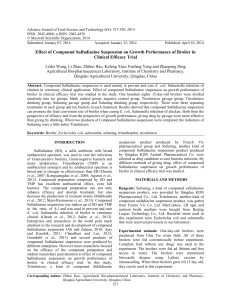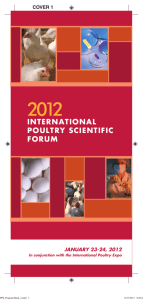BVSc V Assignments – Second Semester 2005
advertisement
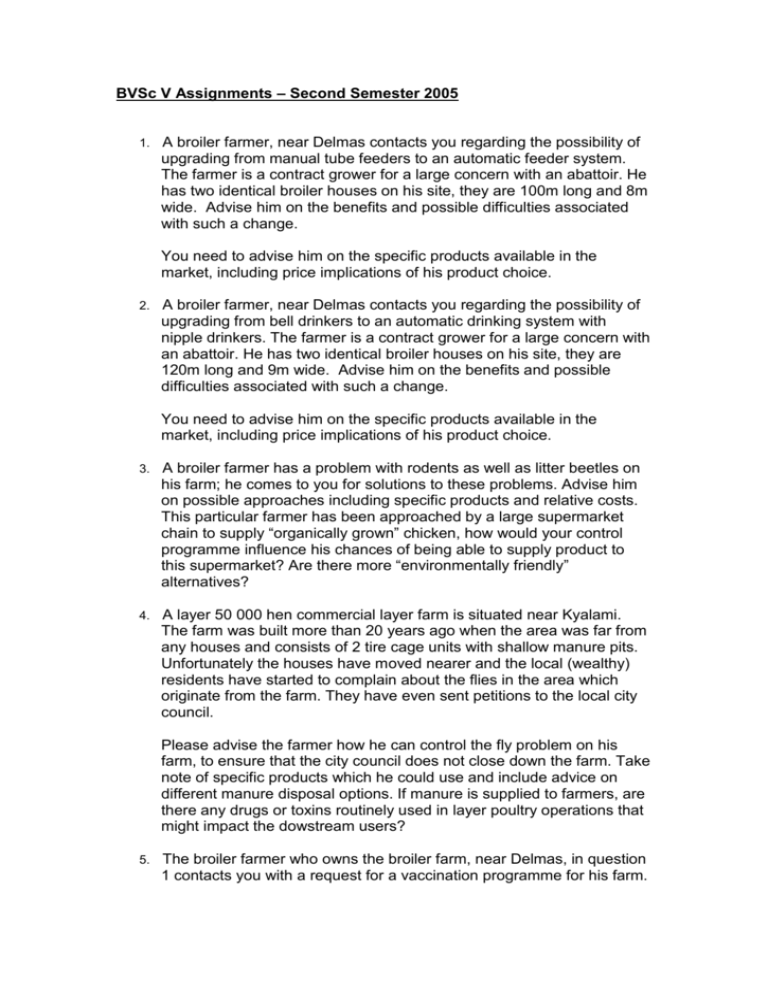
BVSc V Assignments – Second Semester 2005 1. A broiler farmer, near Delmas contacts you regarding the possibility of upgrading from manual tube feeders to an automatic feeder system. The farmer is a contract grower for a large concern with an abattoir. He has two identical broiler houses on his site, they are 100m long and 8m wide. Advise him on the benefits and possible difficulties associated with such a change. You need to advise him on the specific products available in the market, including price implications of his product choice. 2. A broiler farmer, near Delmas contacts you regarding the possibility of upgrading from bell drinkers to an automatic drinking system with nipple drinkers. The farmer is a contract grower for a large concern with an abattoir. He has two identical broiler houses on his site, they are 120m long and 9m wide. Advise him on the benefits and possible difficulties associated with such a change. You need to advise him on the specific products available in the market, including price implications of his product choice. 3. A broiler farmer has a problem with rodents as well as litter beetles on his farm; he comes to you for solutions to these problems. Advise him on possible approaches including specific products and relative costs. This particular farmer has been approached by a large supermarket chain to supply “organically grown” chicken, how would your control programme influence his chances of being able to supply product to this supermarket? Are there more “environmentally friendly” alternatives? 4. A layer 50 000 hen commercial layer farm is situated near Kyalami. The farm was built more than 20 years ago when the area was far from any houses and consists of 2 tire cage units with shallow manure pits. Unfortunately the houses have moved nearer and the local (wealthy) residents have started to complain about the flies in the area which originate from the farm. They have even sent petitions to the local city council. Please advise the farmer how he can control the fly problem on his farm, to ensure that the city council does not close down the farm. Take note of specific products which he could use and include advice on different manure disposal options. If manure is supplied to farmers, are there any drugs or toxins routinely used in layer poultry operations that might impact the dowstream users? 5. The broiler farmer who owns the broiler farm, near Delmas, in question 1 contacts you with a request for a vaccination programme for his farm. He is concerned about the recent outbreaks of Newcastle disease that have been reported on the Highveld. Design a complete (not only for Newcastle disease) vaccination programme for a broiler farm like the one in question 1, where there is a significant risk of a Newcastle disease outbreak. Your advice should include: specific product choices, exact days for administration of vaccines and recommended methods of application. You should be able to defend specific choices with scientific argument. Cost/ benefit aspects should also be addressed. 6. Discuss the control of coccidiosis in broiler breeders with particular reference to vaccination. Give details of products available and their correct useage. 7. Mycoplasmal disease is a chronic and economically significant disease of chickens. Discuss the consequences of the disease and the control and treatment of Mycoplasmal (M. gallisepticum, M. synoviae) infections in all types (broilers, layers, broiler breeders) of commercial chickens in South Africa. 8. Discuss and try to quantify the risks to human health posed by Salmonella infections of chickens and what steps can be taken – in the South African context - to control Salmonella in chickens in order to reduce these risks. 9. You are asked to investigate a problem of Aspergillosis in an integrated broiler production company. How would you go about determining the possible source of the problem and what steps would you take to control the disease on breeder farms, in the hatchery and on broiler farms. Details of products and their application should be included. 10. ILT has become a problem disease in layer flocks across South Africa. Make a study of the disease and advise on appropriate control strategies. Discuss the various vaccines available and their advantages and disadvantages as well as the risks associated with using them. A cost/benefit estimate of ILT vaccination should be carried out. What would you do in the event of an outbreak of the disease on a layer farm? 11. Recent outbreaks of Newcastle disease around South Africa have again highlighted the risks associated with this disease. Effective immunisation of chickens, and in particular broilers, has become critically important. The route and method of application of Newcastle disease vaccine to broilers has a significant impact on the immune response of the birds to the vaccines. Discuss the nature of the immune response to Newcastle disease in chickens as well as the advantages and disadvantages of different application techniques under field conditions, where the risk of challenge is substantial. 12. A broiler farmer near Delmas has two identical broiler houses on a site, they are 100m long and 8 m wide. The houses are 15m apart and the site is surrounded by a 2m high barbed wire fence. He has a second identical site on the farm, about 300m away from the first site. 30 000 boilers are placed alternately on each site at 4 week intervals. The chickens produced are sold to an abattoir 35km away where they are slaughtered and sold to supermarket chains. He has a serious (60% mortality) outbreak of Newcastle disease on the first site. The surviving birds are now 32 days old and weigh about 1kg. You are the private veterinarian who makes the diagnosis. (with some help from a virologist). What are your legal obligations under the circumstances? What would the state veterinarian do once advised of the outbreak? What advice would you give the farmer in terms of a Newcastle disease vaccination programme, vaccine application and biosecurity requirements to control future outbreaks and to avoid spread of the disease? Give detailed and practical suggestions at each stage of the process. A medium-sized broiler farm similar to the one described in question 1 suffers an outbreak of velogenic Newcastle disease with serious losses 13. “Organic farming” has become a buzz-word (phrase?) today. Investigate what is actually meant by this and related terms around the world and what the consumer can expect to get when buying different forms of “organically grown chickens”. What is the situation in South Africa today in this arena? 14. Recent legislation in the European Union has been introduced whereby the use of conventional cage systems for layers will be phased out by 2012. A lot of work has been done to investigate the possible alternatives to this system. Evaluate the work done to date and assess whether phasing out conventional cages is realistic. What would be your assessment of such legislation in the South African context? 15. Over the past decade, the European Union has placed ever-increasing restrictions on drugs used in animals raised for human consumption. In particular they have restricted the use of antibiotics, antibiotic growth promotrs and anticoccidials. Please track the development of these restrictions and study the effects they have had on the European poultry industry. What alternative strategies have evolved to deal with the problems that arise ? 16. As a consequence of the changes in legislation in the European Union, many antibiotic type products have become unavailable to the South African poultry industry over the past decade. It is expected that many others will soon also cease to be available. A particular challenge has been the withdrawal of antibiotic growth promoters and certain coccidiostats from the market. What products are available in the South African market to “replace” these products and how do they work? 17. Discuss the dangers to human health posed by products routinely added to poultry rations. Consider also the risks to poultry health posed by drugs used in human health care. (If you are interested you may also wish to consider the impact that HIV/AIDS may have on the South African poultry industry from a health as well as an economic point of view. – optional) 18. Avian influenza : discuss the recent outbreaks in South Africa in ostriches and chickens and the impact they have had on the South African poultry and ostrich industries. These impacts may be to reduce exports, increase costs of disease control or even to reduce production. What control strategies are available and what will be the consequences of using these strategies on South Africas export opportunities? What risk is posed to human health by the current Avian Influenza outbreaks in South Africa? 19. Take a detailed look at the control of Gumboro disease (IBD) in broilers, including how broiler breeder flocks are vaccinated in order to assist with the control of IBD in broilers. Does the control of the disease differ in layer flocks. Some new technology which allows day old vaccination of broilers against IBD has recently been launched into the South African market – please include this in your discussion. 20. Broilers reach maturity earlier every year. This means that effective vaccination of broilers also becomes increasingly challenging. One solution to the problem has been to vaccinate eggs “in-ovo” before they even hatch. Please investigate this technology and how it works as well as the vaccinations which can be applied in this way at present and in the future. 21. A client approaches the Poultry Reference Centre wanting to compare the effiacy of their new IBD vaccine with IBD vaccines already available in the South African market. Design a research protocol according to which this trail can be carried out. Any such protocol must take note of prevous similar trial work that has already been done and also cognisance of the facilities available at the PRC. (This assignment would need to be done in collaboration with me. Students may also become involved in carrying out the trial) 22. I have similar research trials (see 21) for Fowl Typhoid and Infectious Bronchitis vaccines that need to be done.

